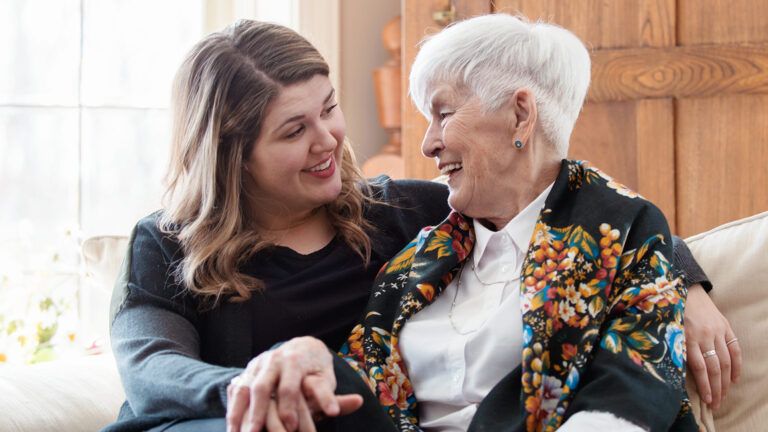I recently lost my mother to congestive heart failure after 15 months in at-home hospice care. We were so blessed to have her as long as we did after her hospice diagnosis, and that time gave us more opportunities to get her affairs in order in the way that she wanted—a crucial responsibility for me, as the oldest of her seven children and the executor of her estate.
But as the executor of my mom’s estate, I learned that caregiving continues, even after your loved one has passed on. I transitioned from being a long-distance caregiver for my mom’s life to a caregiver for her memory. It’s my responsibility to ensure that all of her final wishes come true, to the best of my ability. That means driving out of town to my mom’s home and attending appointments at the probate court to execute her will, making endless phone calls to settle bills and debts, and dedicating months of time to cleaning and remodeling to put her home up for sale.
Reflecting on my experience as a long-distance caregiver, there were many things I wish I had known in advance that could have made the journey a lot less stressful. Here are some caregiving lessons I learned along the way.
1) See if long-term care insurance is right for your loved one.
If it’s not too late, check into getting long term care insurance for your parents because Medicare alone was of no help to our family. For us, Medicare didn’t cover a nurse to provide the care my mom needed and private companies can be pricey at $50 an hour. If your loved one needs 24-hour care, the expense could really break the bank.
2) Have your loved one add your name to their bank account as soon as possible.
It’s important to have your loved one add your name to their bank account so that you will have access to the funds if needed for funeral costs, and mortgage payments, utilities, etc., Otherwise expect delays from the banks and others that can stress you unnecessarily with the financial costs that will occur if you are not financially able to foot the bill yourself until you can obtain the cash.
3) Make sure your loved one has a will.
Establish if there is a will, if not, encourage your family member to make one, have it notarized with three witnesses not related to anyone in the family and have more than one certified copy.
Identify the Executor of the will and his/her duties. If the executor is you, make an appointment with the probate court as soon as possible after the member is deceased. This will expedite any of the work you will have to do to prepare for the funeral or other important things that may come up in preparation for the final homegoing service and unforeseen problems. Until you are cleared with the probate court as the executor of the will or owner of any property willed to you, you can expect delays so make sure you have these items checked off so that you will not be stressed out and wondering which direction to turn.
4) Keep good financial records.
The executor of a will is not personally responsible for any unpaid bills, but it is helpful to maintain a record of all of your loved one’s bills and the month and date that those bills are due. After your loved one passes, make sure each creditor gets a copy of the death certificate noting date and cause of death. If there is not enough money in the estate to cover any balance left on the accounts, share that with the creditor. (Once death is verified, most companies will write off the remaining balance.)
And as a bonus tip:
5) Take time to grieve.
All throughout your caregiving journey, grief can overwhelm you at unexpected times. As caregivers, we’re usually so busy getting things done and making sure everything is taken care of that we can forget to process our own grief over what’s happening with our loved one. It’s also hard for people who are not caregivers to understand how much added pressure caregiving can be, which can leave us feeling vulnerable and unsupported. Make sure to check in with yourself. Break down when you need to. Ask for help when you need to. Find a grief support group, a therapist, a caregiving community. Ask your friends and family for space to grieve when you need to. Stay in touch with your emotions so that you can communicate with others what it is you need to help ease the stress of caregiving. There’s no designated period for grief; it comes in waves and some days will be better than others. Take the time that you need when you need it.
Death of a family member can be devastating, exhausting, and painful but with faith in God, supportive family, friends and a little help from other sources, you can get through it.






